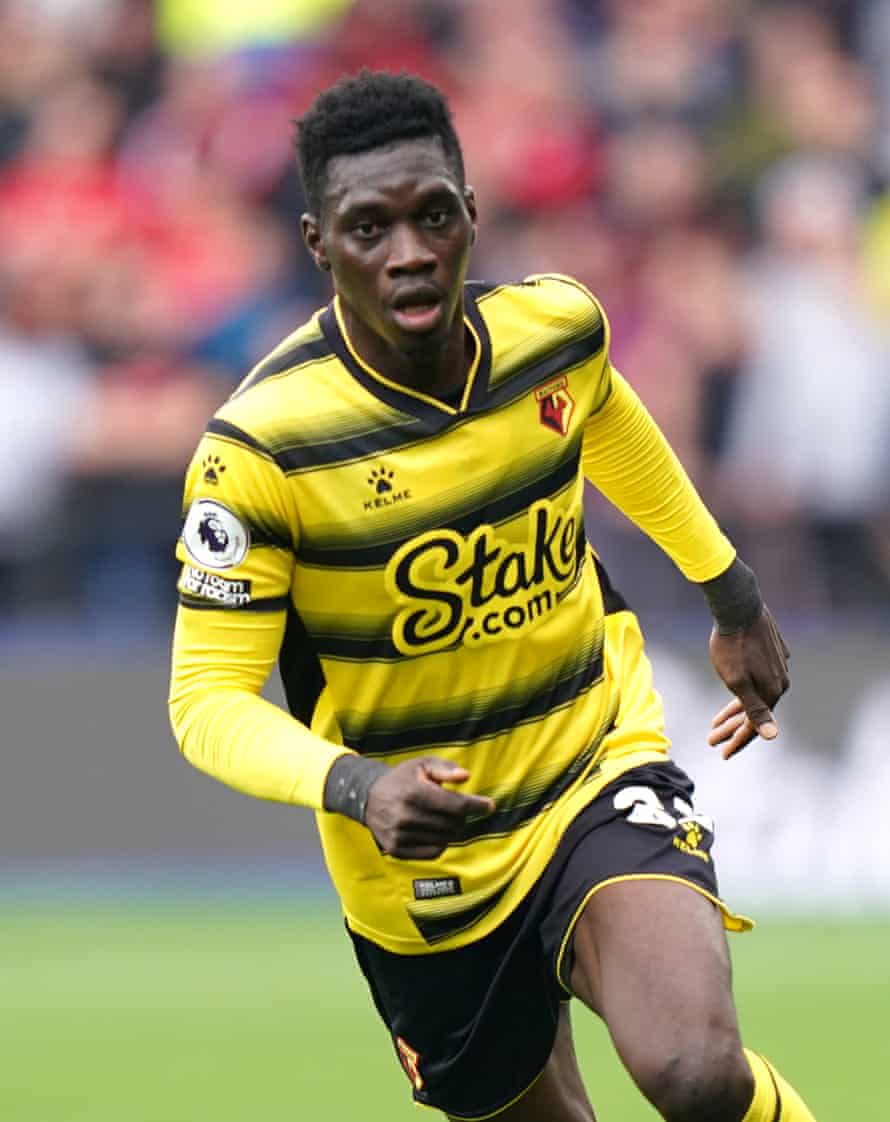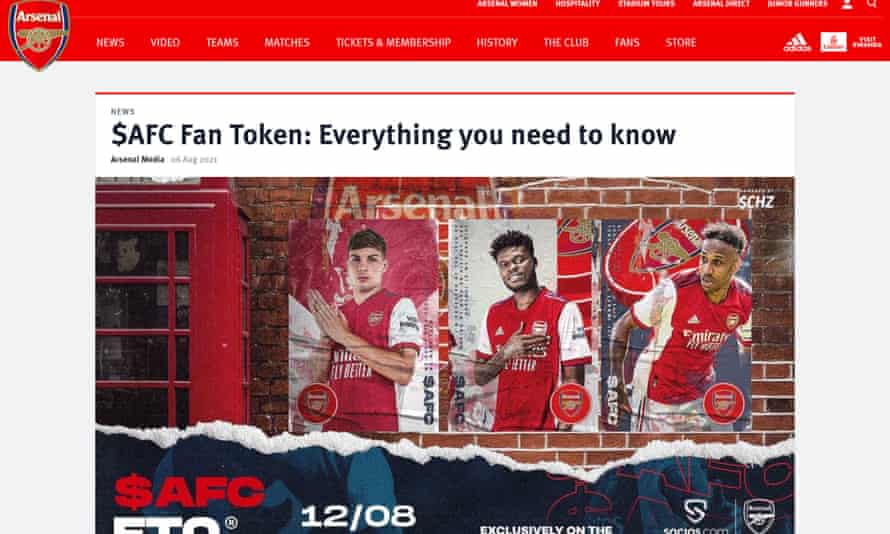When FC Barcelona took to the pitch for the 2021 Spanish Super Cup final, the trophy wasn’t the only prize at stake.
Thousands of blaugrana fans were also keeping an eye on the market for FCB’s “fan token”, the club’s very own cryptocurrency. Socios, the web-based platform that pioneered fan tokens, had promised to “burn” 20,000 tokens for every goal Barcelona scored – and 40,000 if they lifted the cup.
In theory, success on the pitch would increase the scarcity of the currency, boosting its value. In practice, Barcelona lost the game and, footballing passions aside, it didn’t make much difference anyway. With 3.5m of the tokens in circulation, not to mention millions more retained by the club for future issuance, a few thousand here or there wouldn’t have moved the needle.
Q&A
What is cryptocurrency?
Show
Cryptocurrencies are an alternative way of making payments to cash or credit cards. The technology behind it allows the ‘money’ to be sent directly to others without it having to pass through the banking system. For that reason they are outside the control of governments and are unregulated by financial watchdogs – and transactions can be made in a way that keeps you reasonably pseudonymous.
If you own a crypto-asset you control a secret digital key that you can use to prove to anyone on the network that a certain amount of that asset is yours. If you spend it, you tell the entire network that you have transferred ownership of it, and use the same key to prove that you are telling the truth. Over time, the history of all those transactions becomes a lasting record of who owns what: that record is called the blockchain.
Bitcoin was one of the first and biggest cryptocurrencies and has been on a wild ride since its creation in 2009, sometimes surging in value as investors have piled in – and occasionally crashing back down. Dogecoin – which started as a joke – has also seen a stratospheric rise in value.
Sceptics warn that the lack of central control make crypto-assets ideal for criminals and terrorists, while libertarian monetarists enjoy the idea of a currency with no inflation and no central bank.
The whole concept of cryptocurrencies has been criticised for its ecological impact, with “mining” for new coins requiring vast energy reserves and the associated carbon footprint of the whole system.
Richard Partington and Martin Belam
But the stunt symbolised something more, the burgeoning love affair between football and cryptocurrency, an alliance that holds the promise of new revenue streams for a game that is already awash with cash but always wants more.
Football finance expert Kieran Maguire thinks clubs have latched on to crypto because revenues from other sources are starting to level off, having risen reliably for decades.
“Football clubs have realised that we’re now at max broadcast revenues, with modest growth at most to look forward to,” he said.
“As far as commercial sponsors are concerned, we’re seeing deals being renewed but not with increased money. The only way to increase matchday sales is to increase prices and fans are reluctant.”
Manchester United – whether one believes the club or not – claims to have 1.1 billion fans on the planet. With revenue of £488m in 2019-20, that’s just 45p per year, per fan.
“Clubs are thinking: ‘Can we ‘find another way of extracting money out of that huge fanbase?’ That’s where tokens come in.”
When AC Milan launched a token in early 2021, it raised $6m (£4.4m) in under an hour, or about 12% of the value of the club’s record signing, Leonardo Bonucci. Paris Saint-Germain’s token, the most valuable, has a market value of $45m.
In the murky and unregulated world of crypto though, it’s hard to know how much clubs are actually making. Socios said last year it had sold $300m worth of fan tokens but would not say how much of that went to the clubs with which it partnered.
Other platforms, such as Binance, are also moving into the fan token market, indicating there is room for growth, particularly given that only a few dozen clubs have entered the market in any meaningful way.
Pedro Herrera, senior blockchain analyst at DappRadar, a marketplace for blockchain-related apps, said that most fans buy tokens for the associated perks, such as votes on small decisions about which song to play over the stadium tannoy after a goal, or entry into a draw to win a signed shirt.
“It’s a win for the fan because they feel more involved; it’s a win for the team because it’s adding a layer of monetisation; and it’s a win for the [crypto] industry because you attract the masses and it’s one step closer to mass adoption.”
Maguire isn’t against crypto but adds a more sceptical tone: “Lots of fans love crypto and in its purest form it’s great. Banks have been overcharging people for years in terms of transaction fees and if crypto can reduce those fees that’s fantastic.”
“The problem is when unscrupulous traders, particularly via social media, seek to exploit fans who think a token is a serious investment product, rather than a glorified collectible.
“It’s magic beans. So long as it’s sold as a digital Panini card, it’s OK. But when it’s being seen as a form of investment, it’s moving into uncomfortable territory.”
“It’s unregulated, it’s volatile and it’s subject to manipulation by people who own large amounts of the asset.”
Fan tokens, though, are a mere paragraph in football’s rapidly unfolding crypto saga.
In 2021, crypto sponsors piled into football and were welcomed with open arms by cash-hungry clubs, leagues and players.

Exchange app Crypto.com sponsors Italy’s Serie A, one of the world’s most glamorous leagues, while Socios is Internazionale’s shirt sponsor. EToro, a trading platform that facilitates investment in multiple cryptocurrencies, has deals with more than half of the clubs in the Premier League.
Southampton players are understood to have been offered the option to be paid bonuses in bitcoin, as part of a £7.5m-a-year deal with Coingaming Group. And in January 2021, striker David Barral made history when he became the first player in a major league to be signed with bitcoin, albeit in Spain’s third tier with Internacional de Madrid.
Much better-known players and ex-pros, such as Paul Pogba and John Terry, are promoting cryptocurrencies, trading platforms and non-fungible tokens (NFTs) – the controversial digital art form – too.
This should come as no surprise given the reach that big-name stars have via social media and the money they can make from promotions. Other partnerships are perhaps more unexpected. Visitors to the Twitter profile of former Republic of Ireland international Tony Cascarino might have been wrongfooted by the former striker’s sudden change of pace midway through 2021. One moment he was musing on the latest developments in the Premier League, the next he was evangelising about blockchain bank Babb (no relation to former Ireland teammate Phil) and musing that the “crypto market is on fire”.
Even in its infancy, the reputational risks of this new commercial pact between crypto and football have become all too clear. Last year, Manchester City’s deal with a mysterious firm called 3Key Technologies fell apart in a matter of days as it emerged that nobody seemed to know anything about the company or its executives.

In December, Arsenal were rapped on the knuckles by the Advertising Standards Authority (ASA), which banned a club promotion that it said was exploiting fans’ “inexperience or credulity, trivialising investment in crypto assets, misleading consumers over the risk of investment and not making it clear the ‘token’ was a crypto asset”.
“For those in sport looking for sponsorship, it’s a whole new market of opportunity but it’s a bit of a landmine you’re dealing with,” said Bill Esdaile, managing director of sports marketing agency Square in the Air.
“My gut feeling is that such a small percentage of people understand how [crypto] works that too many decisions are made on trust, thinking that if [crypto firms] say they’ve got the money, they do.”
The amounts on offer appear to be going up.
Premier League strugglers Watford have perhaps the country’s biggest crypto deal, a front-of-shirt sponsorship from Stake.com. The site offers crypto gambling, which isn’t legal in the UK but may appeal to the league’s hundreds of millions of viewers around the world.
The arrangement even means that Watford players’ shirt sleeves bear the logo of Dogecoin, a “joke” currency whose value swings around wildly, often in response to tweets by Tesla multibillionaire Elon Musk.
Kieran Maguire estimates that the shirt deal could be worth up to £8m, based on the typical value of such partnerships, while an insider at Watford told MSN in August that the Dogecoin sleeve display added £700,000 into the mix.
Sums like these will become increasingly difficult for clubs to ignore, he thinks, particularly if the government goes ahead with a root-and-branch overhaul of gambling regulation that could see football lose the cash cow of shirt deals with betting firms.
“They [clubs] see the token market as slightly to one side, it won’t get picked up by the gambling review and it will help fill the gap,” says Maguire.
“Those deals of £5m to £8m could be replaced by NFT advertising and by crypto.”
In a recent paper, psychology researcher and gambling expert Dr Phil Newall warned that football sponsorship may be about to swap one risky product for another.
“Research has found that cryptocurrency traders are likely to have problem gambling symptoms, and has identified psychological similarities between cryptocurrency trading and online sports betting,” wrote Newall. He believes removing gambling advertising may create more space in which to legitimise equally dangerous products.
As they burn through cash in the pursuit of glory, it seems unlikely that clubs will worry about that.
